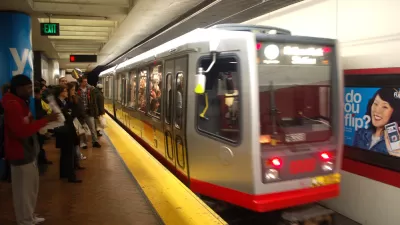Driving accounts for 62 percent of all trips in San Francisco - the same level as when the city's pioneering transit-first policy was adopted 40 years ago. Aaron Bialick looks at the reasons why the policy has led to "scant visible progress."
"When the San Francisco Board of Supervisors adopted a transit-first policy on March 19, 1973 — 40 years ago this week — a return to the early 1900s streetscape may not have been what they had in mind, but the city’s intent to undo decades of urban planning and governance geared towards promoting driving at the expense of public transit was clear," notes Bialick. "A key provision of the policy reads, 'Decisions regarding the use of limited public street and sidewalk space shall encourage the use of public rights of way by pedestrians, bicyclists, and public transit, and shall strive to reduce traffic and improve public health and safety.' (The policy was amended to include pedestrians and bicyclists in 1999.)"
"Yet today, the vast majority of San Francisco’s street space remains devoted to moving and storing private automobiles, making the public right-of-way hostile to walking and bicycling," he adds. "Muni remains underfunded, with vehicle breakdowns and delays caused by car traffic a daily part of riding transit."
While the SFMTA, elected officials, and city residents are all blamed for the lack of progress, some like Supervisor Scott Wiener are working to put muscle behind a policy that many feel was ahead of its time.
"If San Francisco were to be graded on its implementation of transit-first, 'I would give us a C+,' said Wiener. 'In a lot of areas, the MTA is moving in the right direction, but it needs to move faster and more aggressively.'"
FULL STORY: At 40 Years, San Francisco’s Transit-First Policy Still Struggles for Traction

Planetizen Federal Action Tracker
A weekly monitor of how Trump’s orders and actions are impacting planners and planning in America.

Maui's Vacation Rental Debate Turns Ugly
Verbal attacks, misinformation campaigns and fistfights plague a high-stakes debate to convert thousands of vacation rentals into long-term housing.

Restaurant Patios Were a Pandemic Win — Why Were They so Hard to Keep?
Social distancing requirements and changes in travel patterns prompted cities to pilot new uses for street and sidewalk space. Then it got complicated.

In California Battle of Housing vs. Environment, Housing Just Won
A new state law significantly limits the power of CEQA, an environmental review law that served as a powerful tool for blocking new development.

Boulder Eliminates Parking Minimums Citywide
Officials estimate the cost of building a single underground parking space at up to $100,000.

Orange County, Florida Adopts Largest US “Sprawl Repair” Code
The ‘Orange Code’ seeks to rectify decades of sprawl-inducing, car-oriented development.
Urban Design for Planners 1: Software Tools
This six-course series explores essential urban design concepts using open source software and equips planners with the tools they need to participate fully in the urban design process.
Planning for Universal Design
Learn the tools for implementing Universal Design in planning regulations.
Heyer Gruel & Associates PA
JM Goldson LLC
Custer County Colorado
City of Camden Redevelopment Agency
City of Astoria
Transportation Research & Education Center (TREC) at Portland State University
Jefferson Parish Government
Camden Redevelopment Agency
City of Claremont





























